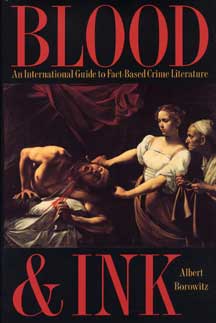Blood and Ink
The Kent State University Press has graciously posted several excepts of a 2002 book titled Blood and Ink, by Albert Borowitz. Of note is a partial introduction to the work in which the Lizzie Borden case is mentioned.
From the website for the book:
Albert Borowitz provides a guide to “fact-based crime literature†focusing on two principle groups of works: non-fictional accounts of crimes and criminal trials, including essays, monographs, journalism, editions of court transcripts, prison histories, and criminal and police biographies and memoirs; and works of imaginative literature, such as novels, stories, or stage works, based on or inspired by actual crimes or criminals.
Blood and Ink, with forewords by Barzun and true-crime writer/historian Jonathan Goodman, will prove to be an invaluable resource to true-crime aficionados as well as to students and scholars of literature, cultural studies, and social history.
Albert Borowitz is a graduate of Harvard University with a B.A. in classics, M.A. in Chinese regional studies, and a J.D. He is also the author of Terrorism for Self-Glorification: The Herostratos Syndrome (The Kent State University Press, 2005). He is a retired partner from the international law firm of Jones, Day, Reavis & Pogue.
Click here to download a PDF of the first 12 pages of the book’s introduction. This is a book I would like to read. Time for Interlibrary Loan again!
Another except:
s.55 Sullivan, Robert Goodbye Lizzie Borden. Brattleboro, Vt.: Stephen Greene, 1974. This volume, written by a judge of the Massachusetts Superior Court, is the first booklength study of the Borden case by a jurist. Judge Sullivan regards as erroneous two evidentiary exclusions made by the trial judge: the ruling that Lizzie’s sworn statements at the inquest could not be admitted since she was then constructively under arrest; and the exclusion of evidence that shortly before the axe murders Lizzie attempted to purchase prussic acid in order, so she said, to mothproof a fur cape. Nevertheless, Sullivan believes that the evidence before the jury established Lizzie’s guilt beyond a reasonable doubt. Sullivan speculates that the jury may have been influenced by news reports of the unrelated axe murder of Bertha Manchester in Fall River shortly before the Borden trial began.





